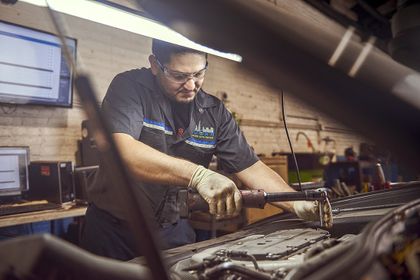What Is Tire Rotation?
Tire rotation is the process of moving your vehicle’s tires from one position to another to ensure even wear. The wear patterns on tires can vary based on factors such as road conditions, driving habits, and the type of vehicle. By regularly rotating your tires, you help extend their lifespan, improve fuel efficiency, and maintain optimal handling. It’s an essential aspect of vehicle maintenance that often gets overlooked, but it plays a significant role in keeping your car safe and efficient on the road.
Why Is Tire Rotation Important?
Most vehicles have different weight distributions, which means that some tires will wear down faster than others. For example, the front tires on a front-wheel drive car are responsible for both steering and providing power to the vehicle, while the rear tires only provide stability. This difference in workload causes the front tires to wear faster. Tire rotation helps balance the wear across all four tires, promoting even tread wear, better performance, and longer-lasting tires.
Without proper tire rotation, you could face premature tire wear, which may lead to the need for early tire replacements. Additionally, unbalanced wear can lead to a rough ride, reduced traction, and increased risk of accidents, especially in adverse weather conditions.
How Often Should You Rotate Your Tires?
It is generally recommended to rotate your tires every 6,000 to 8,000 miles, though this can vary depending on your vehicle manufacturer’s recommendations. It's also a good practice to rotate your tires during routine oil changes. If you notice any signs of uneven wear, such as your car pulling to one side, your tires may need to be rotated sooner.
Some vehicles with specific tire configurations, like all-wheel-drive cars, may require more frequent tire rotations due to the increased strain on the tires. Be sure to check your vehicle’s owner manual for detailed recommendations regarding tire rotation intervals.
What Happens If You Don’t Rotate Your Tires?
Neglecting to rotate your tires regularly can cause a range of issues that affect your vehicle's performance, safety, and overall cost of maintenance. The potential consequences include:
- Uneven Tire Wear: Failing to rotate your tires will lead to uneven wear patterns. The tires that take on more of the vehicle's weight or have more work to do will wear down faster than others, causing them to become less effective.
- Reduced Traction: Unevenly worn tires can cause your car to lose traction, especially in wet or slippery conditions. This can be dangerous, especially when navigating sharp turns or sudden stops.
- Increased Risk of Blowouts: Worn-out tires are more likely to blow out, which could lead to dangerous situations on the road. Tire rotation helps to prevent uneven wear that can contribute to blowouts.
- More Frequent Tire Replacement: Without regular rotation, you'll need to replace tires more often than necessary, which can be costly in the long run.
Benefits of Tire Rotation
Regular tire rotation provides a variety of benefits, including:
- Extended Tire Life: By rotating your tires, you ensure that they wear down evenly, which extends their overall lifespan and reduces the need for premature replacement.
- Improved Fuel Efficiency: Properly rotated tires contribute to a smoother ride and more even contact with the road, which can improve your vehicle’s fuel efficiency.
- Enhanced Safety: Tire rotation ensures that your tires perform at their best, especially in terms of handling, braking, and grip, providing better safety in various driving conditions.
- Better Handling: Tires that are evenly worn provide a better grip on the road, resulting in better handling and a more comfortable driving experience, especially when navigating sharp turns or wet surfaces.
How Tire Rotation Works
Tire rotation involves changing the position of each tire to ensure they all wear evenly. The process can differ depending on whether your vehicle is front-wheel drive, rear-wheel drive, or all-wheel drive. There are a few common patterns used during tire rotation:
- Front-to-Back Rotation: In this method, the front tires are swapped with the back tires. This is typically used for rear-wheel drive vehicles.
- Cross Rotation: In this method, the front tires are moved to the opposite sides of the vehicle, and the back tires are moved to the front. This pattern is often used for front-wheel drive vehicles.
- X-Pattern Rotation: This is used for vehicles with all-wheel drive and involves crossing the tires diagonally. The front-left tire moves to the back-right position, and the front-right tire moves to the back-left position.
Conclusion: Why You Shouldn't Delay Tire Rotation
In Chicago, where road conditions can vary greatly with harsh winters and hot summers, maintaining your tires is essential for the overall health of your vehicle. Tire rotation is an easy and affordable maintenance task that can save you from costly repairs and unsafe driving situations in the future.
Regular tire rotation helps ensure even wear, improve your vehicle’s performance, increase fuel efficiency, and enhance safety on the road. Make sure to incorporate tire rotation into your regular vehicle maintenance routine.
If you're due for a tire rotation or need advice on how to maintain your vehicle’s tires, don’t hesitate to contact us today for an appointment. Our expert mechanics will help keep your tires in top shape and ensure your vehicle is ready to handle whatever the road throws at you.

